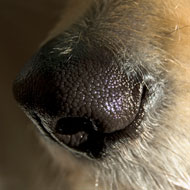Dogs to be trained to sniff out lung cancer

There is a need for cheaper and less intrusive methods of mass screening for lung cancer.
Researchers in New Zealand are exploring whether dogs can be trained to detect lung cancer from breath and saliva samples.
Dr Tim Edwards from the University of Waikato has received a grant of £30,000 to conduct the first part of his research. His team will train pet dogs, including his own dog Tui, to identify the disease using a fully automated scent detection mechanism for dogs.
The dogs will put their muzzle into a device, breaking a beam of light as they sniff the sample. If the dog holds its nose inside for a set period of time, it will be considered a positive indication and the dog receives a food treat.
Dr Edwards - who has also worked overseas using giant pouched rats to sniff out tuberculosis - said there is a need for cheaper and less intrusive methods of mass screening for lung cancer. Often it is too late by the time patients are referred for testing.
“The disease has a high mortality rate, so being able to make even a small difference would help save lives.”
Work is currently being done on developing ‘e-noses’ to detect disease electronically. One day, Dr Edwards said patients may be able to breathe into a machine that can identify disease, but this is not currently a reality.
“Right now we do have dogs,” he added, “and they have some potential according to existing research - but we need to clarify how reliable they can be.”



 The Veterinary Medicines Directorate (VMD) is inviting applications from veterinary students to attend a one-week extramural studies (EMS) placement in July 2026.
The Veterinary Medicines Directorate (VMD) is inviting applications from veterinary students to attend a one-week extramural studies (EMS) placement in July 2026.